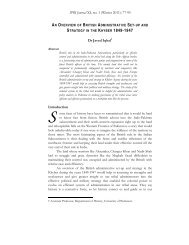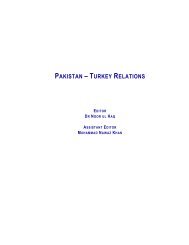120 Whither Kashmir? (Part II) - Islamabad Policy Research Institute
120 Whither Kashmir? (Part II) - Islamabad Policy Research Institute
120 Whither Kashmir? (Part II) - Islamabad Policy Research Institute
Create successful ePaper yourself
Turn your PDF publications into a flip-book with our unique Google optimized e-Paper software.
78 IPRI Factfile<br />
Article 21 of the General Act relating to arbitration similarly refers<br />
to "any dispute", though article 17 dealing with judicial settlement<br />
narrows down its scope to disputes mentioned in article 36 of the<br />
Permanent Court of International Justice. Similarly, the Rio anti-War<br />
Treaty through article 1 provides that "[t]he settlement of disputes and<br />
controversies shall be effected only through the pacific means established<br />
by international law". A number of other treaties could be cited in which<br />
the traditional distinction between "legal" and "political" disputes has<br />
been set aside. However, a jarring note is made by the Charter of the<br />
United Nations which, through article 36, maintains the traditional<br />
distinction and the Statute of the World Court which restricts its<br />
jurisdiction to "legal disputes". But this is understandable because if these<br />
two instruments did not adopt traditionalist attitude in the matter, States<br />
in the international community would turn their back on the Court.<br />
Despite the distinction between legal and political disputes<br />
maintained in the UN Charter and the Statute of the World Court, there<br />
is considerable jurisprudential evidence to suggest that, the Court has not<br />
in practice upheld this distinction. The first case in which the Court<br />
enunciated its position in the matter <strong>Kashmir</strong> Dispute was the advisory<br />
opinion concerning Certain Expenses of the United Nations. Paying lip<br />
service to the above - mentioned distinction, the Court accepted that it<br />
could “... give an advisory opinion only on a legal question. If a question<br />
is not a legal one, the Court has no discretion in the matter; it must<br />
decline to give the opinion requested". Despite this pronouncement, the<br />
Court rejected the argument that it should refuse to give an opinion as<br />
the question asked by the General Assembly was intertwined with<br />
political considerations on the ground that “... most interpretations of the<br />
Charter of the United Nations will have political significance, great or<br />
small. In the nature of things it could not be otherwise. The Court,<br />
however, cannot attribute a political character to a request which invites<br />
it to undertake an essentially judicial task, namely, the interpretation of a<br />
treaty provision".<br />
Next, in the United States Diplomatic and Consular Staff in Tehran<br />
case, the Court again ignored this distinction when it upheld its own<br />
jurisdiction, although there was parallel action by the Security Council in<br />
the matter under consideration. Again in the case concerning Military<br />
and Paramilitary Activities in and against Nicaragua (Nicaragua v. United<br />
States of America), the Court, while dealing with the US objection to its<br />
jurisdiction based on the above distinction, took the same line as in the




